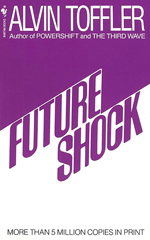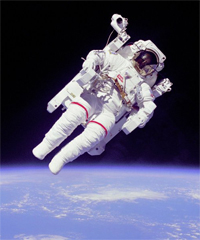
Science has established beyond reasonable doubt that the polar ice caps are melting, the oceans are rising, and the earth is in fact warming due to the burning of hydrocarbons – The “Greenhouse Effect.”
The scientific community reported recently that an asteroid nearly collided with the earth. It missed doing so by only 500,000 miles. Had the collision taken place it would have been equivalent to several thousand hydrogen bombs all exploding at one moment. Whether we like it or not, science is in the news and outer space is here to stay.
Through advances in technology, we are being increasingly exposed to information previously thought impossible. But is all this awareness help or hindrance? We’ve accepted that ignorance isn’t bliss, but often a cruel form of self-imposed resignation, yet what are the dangers of overexposure? Are we prepared to know too much? Are we emotionally prepared for the kinds of decisions this advance information requires? Are we ready? Some of us just got over post-traumatic stress. What’s next, pre-traumatic stress disorder? The future is upon us before we have processed the past. If superconductor technology has its way, the future and the past will be the same moment. What will be required of us to keep pace?
 Astronauts of the future must be trained to depend upon forethought. Forethought is anticipatory thinking that foresees the relationship between a present decision and a future consequence. Alvin Toffler ranks as one of the best-known futurists. His book, Future Shock, became a popular phrase signifying the stress of change on our personal lives. In it, Toffler maintained that changes in every dimension of life were going to accelerate to such speeds that they would overwhelm people and organizations in high-tech urban societies, leaving them in a state of confusion and disorientation.
Astronauts of the future must be trained to depend upon forethought. Forethought is anticipatory thinking that foresees the relationship between a present decision and a future consequence. Alvin Toffler ranks as one of the best-known futurists. His book, Future Shock, became a popular phrase signifying the stress of change on our personal lives. In it, Toffler maintained that changes in every dimension of life were going to accelerate to such speeds that they would overwhelm people and organizations in high-tech urban societies, leaving them in a state of confusion and disorientation.
We are living through one of the great transitions in human history. From an industrial mass society that emphasized conformity to a de-massified society and economy that encourages diversity and individualism. As the speed to which we are being introduced to those things unfamiliar increases once familiar navigational references will become archaic or nonexistent. Precognition and forethought will emerge as the sin qua non of navigational aids for all future astronauts.
Precognition is the ability to relate to events not yet experienced. It requires unusual perceptivity and discernment. Precognition draws upon antecedent experience or knowledge. Each of us depends every day upon antecedent knowledge. It’s a fancy term for knowledge acquired from previous experience.
The second navigational aid is forethought, thinking in anticipation of an event. Forethought acknowledges the relationship of seemingly unrelated events to one another. It correlates a decision made at one point in travel with its natural and logical consequences or future destination. Navigational aids of precognition and forethought will be standard operational procedures for all future travels whether in space or on the ground. For we are all astronauts traveling at different speeds toward an uncertain future. What differentiates us is the speed in which we travel and the destination to which we hope to arrive. What unites us is the quest for navigational dependability that will serve us in the twenty-first century and beyond.
Mental health on space ship earth is currently retrospective. Practitioners of the healing arts are limited to eloquent discourses regarding the causes of human misery. What the past one hundred years has taught us is there is no cure in diagnosis.
 Twenty-first century travelers must no longer rely upon hindsight as a suitable navigational aid owing to the speeds at which we now travel. The training in forethought and precognition, the linking of today’s decisions with corresponding effects of tomorrow will be critical if we are to avoid a variety of volitional hazards. For instance, we know today that excessive alcohol consumption relates to a decrease in health, memory, and an increase in birth defects, and that certain family units produce emotionally immature offspring. The debate is over. Twenty-first century computers enable us to demonstrate in a fraction of a second the reciprocal relationship between two seemingly unrelated events. As a population of astronauts hurling into an uncertain future, we must begin to acknowledge our innate abilities to make similar connections.
Twenty-first century travelers must no longer rely upon hindsight as a suitable navigational aid owing to the speeds at which we now travel. The training in forethought and precognition, the linking of today’s decisions with corresponding effects of tomorrow will be critical if we are to avoid a variety of volitional hazards. For instance, we know today that excessive alcohol consumption relates to a decrease in health, memory, and an increase in birth defects, and that certain family units produce emotionally immature offspring. The debate is over. Twenty-first century computers enable us to demonstrate in a fraction of a second the reciprocal relationship between two seemingly unrelated events. As a population of astronauts hurling into an uncertain future, we must begin to acknowledge our innate abilities to make similar connections.
If it is possible to resolve the problems of today, could it be possible to avoid the problems of tomorrow? Yes, I believe it is clearly possible. What is required is the ability to anticipate life events. We must be able to see into the future. Forethought and pre-cognition is that ability.

